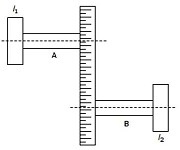Practice Test: Question Set - 01
1. The motion between a pair which takes place in __________ is known as incompletely constrained motion.
- (A) One
direction only
- (B) Two
directions only
- (C) More
than one direction
- (D) None
of these
2. A torsional system with discs of moment of inertia I₁ and I₂ as shown in the below figure, is gear driven such that the ratio of speed of shaft B to shaft A is 'G'. Neglecting the inertia of gears, the equivalent inertia of disc on shaft B at the speed of shaft A is equal to
- (A) G.I₂
- (B) G².I₂
- (C) I₂/G
- (D) I₂/G²
3. The frictional torque transmitted in a flat pivot bearing, considering uniform pressure, is (where μ = Coefficient of friction, W = Load over the bearing, and R = Radius of bearing surface)
- (A) (1/2)
μ W R
- (B) (2/3) μ W R
- (C) (3/4) μ W R
- (D) μ W
R
4. A typewriter mechanism has 7 numbers of binary joints, six links and none of higher pairs. The mechanism is
- (A) Kinematically
sound
- (B) Not
sound
- (C) Soundness
would depend upon which link is kept fixed
- (D) Data
is not sufficient to determine same
5. The magnitude of velocities of the points on a rigid link is
- (A) Directly
proportional to the distance from the points to the instantaneous center and is
parallel to the line joining the point to the instantaneous center
- (B) Directly
proportional to the distance from the points to the instantaneous center and is
perpendicular to the line joining the point to the instantaneous center
- (C) Inversely
proportional to the distance from the points to the instantaneous center and is
parallel to the line joining the point to the instantaneous center
- (D) Inversely
proportional to the distance from the points to the instantaneous center and is
perpendicular to the line joining the point to the instantaneous center
6. The maximum efficiency of spiral gears is (where θ = Shaft angle, and φ = Friction angle)
- (A) sin (θ + φ)
+ 1/ cos (θ - φ) + 1
- (B) cos (θ - φ)
+ 1/ sin (θ + φ) + 1
- (C) cos (θ + φ)
+ 1/ cos (θ - φ) + 1
- (D) cos (θ - φ)
+ 1/ cos (θ + φ) + 1
7. If the opposite links of a four bar linkage are equal, the links will always form a
- (A) Triangle
- (B) Rectangle
- (C) Parallelogram
- (D) Pentagon
8. The velocity of a flat-faced follower when it has contact with the flank of a circular arc cam, is given by
- (A) ωR cosθ
- (B) ω(R
- r₁) cosθ
- (C) ω(R
- r₁) sinθ
- (D) ωr₁
sinθ
9. Two systems shall be dynamically equivalent when
- (A) The
mass of two are same
- (B) C.G.
of two coincides
- (C) M.I.
of two about an axis through e.g. is equal
- (D) All
of the above
10. The motion of a shaft in a circular hole is an example of
- (A) Completely
constrained motion
- (B) Incompletely
constrained motion
- (C) Successfully
constrained motion
- (D) None
of these
11. A rotary internal combustion engine has __________ cylinders.
- (A) Four
- (B) Five
- (C) Six
- (D) Seven
12. Cam size depends upon
- (A) Base circle
- (B) Pitch circle
- (C) Prime circle
- (D) Outer circle
13. A point B on a rigid link AB moves with respect to A with angular velocity ω rad/s. The total acceleration of B with respect to A will be equal to
- (A) Vector sum of radial component and Coriolis component
- (B) Vector sum of tangential component and Coriolis component
- (C) Vector sum of radial component and tangential
component
- (D) Vector difference of radial component and
tangential component
14. The equation of motion for a vibrating system with viscous damping is
(d²x/dt²)
+ (c/m).(dx/dt) +
(s/m).x = 0, if the roots of the equation are __________ then the system
will be under damped.
- (A) Equal
- (B) Real
- (C) Complex conjugate
- (D) None of these
15. The purpose of a link is to
- (A) Transmit
motion
- (B) Guide
other links
- (C) Act
as a support
- (D) All of the above
Next Tests:

